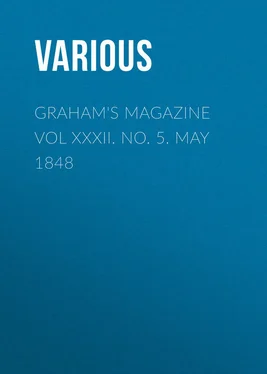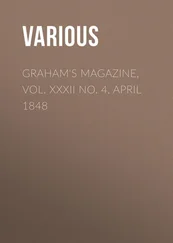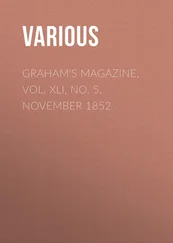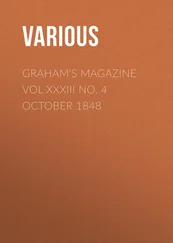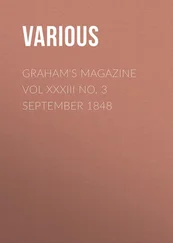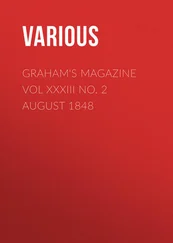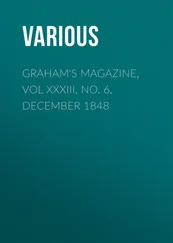Various - Graham's Magazine Vol XXXII. No. 5. May 1848
Здесь есть возможность читать онлайн «Various - Graham's Magazine Vol XXXII. No. 5. May 1848» — ознакомительный отрывок электронной книги совершенно бесплатно, а после прочтения отрывка купить полную версию. В некоторых случаях можно слушать аудио, скачать через торрент в формате fb2 и присутствует краткое содержание. Издательство: Иностранный паблик, Жанр: periodic, literature_19, foreign_edu, на английском языке. Описание произведения, (предисловие) а так же отзывы посетителей доступны на портале библиотеки ЛибКат.
- Название:Graham's Magazine Vol XXXII. No. 5. May 1848
- Автор:
- Издательство:Иностранный паблик
- Жанр:
- Год:неизвестен
- ISBN:нет данных
- Рейтинг книги:3 / 5. Голосов: 1
-
Избранное:Добавить в избранное
- Отзывы:
-
Ваша оценка:
- 60
- 1
- 2
- 3
- 4
- 5
Graham's Magazine Vol XXXII. No. 5. May 1848: краткое содержание, описание и аннотация
Предлагаем к чтению аннотацию, описание, краткое содержание или предисловие (зависит от того, что написал сам автор книги «Graham's Magazine Vol XXXII. No. 5. May 1848»). Если вы не нашли необходимую информацию о книге — напишите в комментариях, мы постараемся отыскать её.
Graham's Magazine Vol XXXII. No. 5. May 1848 — читать онлайн ознакомительный отрывок
Ниже представлен текст книги, разбитый по страницам. Система сохранения места последней прочитанной страницы, позволяет с удобством читать онлайн бесплатно книгу «Graham's Magazine Vol XXXII. No. 5. May 1848», без необходимости каждый раз заново искать на чём Вы остановились. Поставьте закладку, и сможете в любой момент перейти на страницу, на которой закончили чтение.
Интервал:
Закладка:
For more than an hour that evening I sat beside my window, looking on the serene prospect around me, and endeavoring to lay something of that external stillness to the restlessness of my disturbing fancies. All around was spiritualized by the moonlight; the trees on the lawn threw long shadows on the grass, and far away, in their mysterious and majestic silence, stood the eternal mountains; like gigantic watchers, they kept their vigil over the placid scene beneath – the vigil of untold centuries. Cloudless, unsympathizing, changeless, they had no part in the busy drama of human experience their loftiness overlooked, and now they loomed with shadowy outline, through the sanctifying light, habitants alike of earth and sky.
I anticipated tidings from Theresa with that interest which slight occurrences lend a life whose stirring events are few.
To me, she engaged to record her thoughts and impressions as they came, and to be to me what, under similar circumstances she would have been, whose sweet face for a few years brightened my life, and who now sleeps, in her childish beauty, by her mother's side.
"You will have learned from my letter to my mother, my kind friend, all the little details of my journey and safe arrival at my destination. I felt as if some of my visions of romance were realized, when this beautifully adorned place, in its strange and solemn stillness, stood before me. All the grounds surrounding the convent-buildings are highly cultivated and tastefully improved, presenting a vivid contrast between the wild luxuriance of nature, and the formal, artificial life within these cold, stern walls. Several of the nuns, with downcast eyes and thoughtful steps, were taking their monotonous exercise in the paths through the shrubbery; and shall I confess that I looked with mingled doubt and envy upon those dark-robed figures – doubt, if the restlessness of humanity can thus be curbed into repose, and envy of that uninterrupted peace, if, indeed, it may be gained. Strange seem this existence of sacrifice, this voluntary abandonment of life's aims and more extended duties, this repelling, crushing routine of penance and ceremony, with which, in the very midst of activity, and in the bloom of energy, vain mortals strive to put off the inevitable fetters of mortality. Doubtless, many, from long habit, have grown familiar with this vegetative, unbroken seclusion, and accustomed to struggle with tenderness, and conquer impulse, have ceased to feel affection, and rarely recall the friends of their busier days – sad consummation of womanhood's least enviable lot.
"But I believe it is, in all sincerity, from self-delusion, not from deception, that these women, many of them in the freshness of youth, separate themselves from the wide privileges of their sex, and contract their hearts into the exclusive and narrow bounds of a convent's charities. What mental conflicts must have been theirs, before, from the alluring gloss of expectation, they could turn to embrace a career like this. Some, perhaps, believed the possibility of winning tranquillity by shutting out the temptation of the world, believed that dust might be spiritualized, and the mind, debarred from its natural tendencies, taught to dream only of heaven. Others have sought the cloister as a refuge for hearts that loved too well, and memories all too faithful. God help such! – for this is no place to forget. And it may be, that after years of painful self-control and depressing experience, some here have gradually attained the conviction that their efforts are vain, their yearnings not here to be fulfilled – what, then, must solitude be to them but an enduring sorrow? It is too late to retrieve the past – the fatal vows have been spoken – those frowning walls are impassable – and the dark folds of that solemn veil are evermore between the penitents and human sympathy. Never may their footsteps tread the free earth again, save within those still and mocking limits; never will the bright, rewarding world of social ties dawn upon their languid gaze, though, alas! its beauty will flash upon their thoughts, through the loneliness of the silent cell, perhaps even amid penance and prayer. I look with profound, inexpressible interest on these sisters, in their ungraceful, but romance-hallowed costume, and wish, as I watch them, that I could read something of what the past has been to each, and trace the various motives that led to this irrevocable fate. This monotonous life has all the glow of novelty for me; and I ponder with inexhaustible interest, and blended reverence and pity on the hidden moral conflict, continually occurring among beings who strive to taste angels' pleasures while escaping human duties, and are reminded of the folly of such attempts, by the perpetual presence of temptation, and all the self-reproach, regret, and disappointment which, Heaven be thanked! the angels never feel. I can scarcely tell, as yet, how I shall like learning here. My studies have always been such a pleasure to me, with you, that it appears strange to associate them with strangers. I am resolved to devote much time to drawing and miniature painting, for which you know I had always a penchant , and in the course of a month or two I shall commence the study of German. What a world of pleasure is before me. Will you not love me better, if I return to you an artist, brim full of German legends? All that I hope and aspire to, leads to that question – will these acquisitions render me more beloved?"
"Theresa is too ambitious, too restless," said Gerald, as he finished the perusal of this letter, "she will only render herself discontented and conspicuous by this wild, idle desire for superiority."
I felt somewhat provoked at his querulous words, for in my partial eyes Theresa seldom erred, and I knew this solicitude for mental progress, though as yet vague and undirected, was inseparable from her active and energetic intellect. But Gerald's opinions were common ones with his sex, and he coldly censured when away from their attractions, the very traits of character which, when present, involuntarily fascinated his imagination. And this is an ingratitude which almost inevitably falls to the share of a gifted woman. Unfortunately, genius does not shield its possessor from defects of character; and her very superiority in raising her above the level of the many, renders her failings more evident, and those who are forced mentally to admire, are frequently the first morally to condemn. The following are extracts from Theresa's letters, written at various intervals during the first year of her residence at the convent; and they will perhaps serve to reveal something of the rapid development of her mind, with the self-forgetfulness and ambition so peculiarly blended in her nature. She is the only one I have ever seen who possessed extreme enthusiasm without selfishness, and the strong desire to excel, without envy. There was a harmony in her being as rare as it was winning; and while many instances of her childish generosity and spontaneous disinterestedness rise on my memory, I feel almost bitterness at the recollection of how unworthily her pure heart was appreciated, and how sad was the recompense of all she suffered.
"I am happy, my kind friend, happier than I believed it possible for me to be, when away from those I love. But I study incessantly, and in acquiring and hoping, I have no time left for regret. When I recall you, it is not repiningly, but with a thousand desires for your approval, and increased anxiety to become all you can wish. You will, perhaps, consider this vanity; but, indeed, that would be unjust, for it is in all humility, with a painful consciousness of my own deficiencies that I strive so eagerly to grow wiser and better. Surely it is not vanity, to yearn to merit tenderness!.. You ask if I have made any new friends. No; and I can scarcely tell why. There are several here whose appearance has interested me – and you know how rapturously I admire personal attractions; but I feel a reserve I can neither conquer nor explain. Friendship seems to me too holy and enduring to be lightly bestowed, and yet I desire with inexpressible earnestness, to find some one of my own age who would love and comprehend me – some mind in whose mirror I could trace an image of my own. I have gained something like a fulfillment of this wish in Gerald; but he is naturally less enthusiastic than I am, and of course cannot enter into the fervor of my expectations. He thinks them vain an idle – and so, in truth, they may be; but only their irrevocable disappointment will ever convince me of their folly… I have been painting a great deal, beside my regular exercises, for my own amusement; I take such delight in testing my power to reflect the visible charm of beauty, and in endeavoring, however faintly, to idealize humanity. Among other efforts, I have finished a miniature of one of the young sisters here, whose sad, placid face, seemed to sketch itself upon my memory. Of course, the likeness was drawn without her knowledge – she has put away from her thoughts all such vanities. I often look on the picture, which is scarcely more tranquil than the original; and I wish I could speak a word of welcome sympathy to one who is so young, and yet so sorrowful. I was much touched, a few days since, by accidentally witnessing an interview between this nun, whose convent name is Cecelia, and her sister. It seems that she had taken the vows in opposition to the wishes and counsel of all her friends, having forsaken a widowed mother and an only sister for spiritual solitude and the cloister. I was copying an exquisite engraving of the Madonna, which adorns the apartment allotted to visiters, when a young lady entered, and desired to see her sister. The nun came, but not beyond the grating which bounds one side of the room. Those bars – signs of the heart's prison – were between beings who from infancy had been undivided, whose pleasures and pains through life had been inseparable, and who were now severed by a barrier impassable as the grave. They contrasted strongly, these two sisters, so nearly the same age, so different in their hopes for the future. The guest wept constantly, and her words, spoken in a loud tone, were broken by bursts of grief; but the other was composed, almost to coldness – there was no evidence of distress on her marble cheek, and her large, gray eyes, were quiet in their gaze. She had evidently learned to curb emotion and regret – the past for her was a sealed book, with all its remembrances; she was a woman without her sex's loveliest impulses – a sister without tenderness, a daughter without gratitude. They parted, as they had met, each unconvinced, each grieving for the other – the visiter returned to her holy filial duties, the devotee to her loneliness. My friend, on which of these sisters do the angels in heaven look down most rejoicingly? This scene made me sorrowful, as every thing does which destroys an illusion. I had entertained such romantic ideas of life in the cloister, it seemed so tempting to me in its rest, its spirituality; and now I realize that we have no right to such rest, that it is not ours to shrink from the duties, to shun the penalties, to crush the affections of humanity – and my visions of lonely happiness have passed away pour toujours . If ever I could be induced to forsake a world that now appears to me so rich in promise; if ever I am numbered among the tried in spirit, and broken in heart, some active solace must be mine, not this fearful leisure for thought and remembrance. My lot is to be a restless one; and whatever else the future may hold for me, I know, in the spirit of prophecy, it will bestow nothing of repose… You tell me my little sister grows every day more lovely. I can readily believe it. There is something very fascinating in the style of her childish beauty, something that appeals to tenderness and seeks for love – and she is always the reality that prompts my dreams of angels. Is it not unwise, my friend, to hold the gift of personal beauty of little value, when it thus involuntarily commands affection, and can win the world's charity for many faults?"
Читать дальшеИнтервал:
Закладка:
Похожие книги на «Graham's Magazine Vol XXXII. No. 5. May 1848»
Представляем Вашему вниманию похожие книги на «Graham's Magazine Vol XXXII. No. 5. May 1848» списком для выбора. Мы отобрали схожую по названию и смыслу литературу в надежде предоставить читателям больше вариантов отыскать новые, интересные, ещё непрочитанные произведения.
Обсуждение, отзывы о книге «Graham's Magazine Vol XXXII. No. 5. May 1848» и просто собственные мнения читателей. Оставьте ваши комментарии, напишите, что Вы думаете о произведении, его смысле или главных героях. Укажите что конкретно понравилось, а что нет, и почему Вы так считаете.
